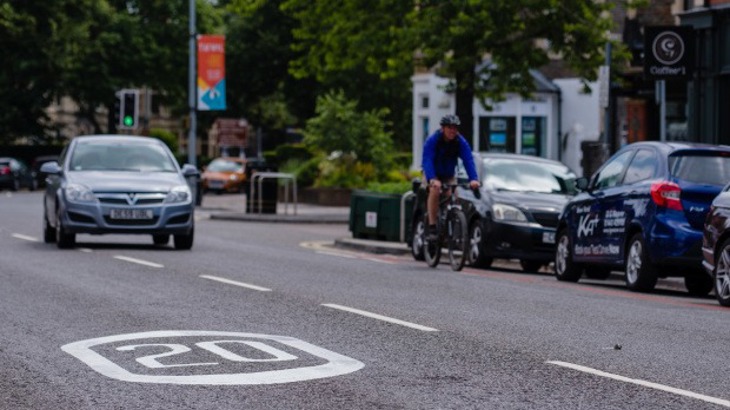Opponents of the introduction of the 20mph speed limit in Wales have frequently cited a Belfast study which found the initiative had little impact. In this blog, Anne Madden, Policy and Communications Manager at Sustrans, explains that this misrepresents the actual findings of the research.

A 20mph street in Cardiff, Wales. Credit: Jonathan Bewley
Making the case for traffic solutions has sadly become a more hotly contested place with the polarisation of opinion.
The recent introduction of a default 20mph speed limit in Wales has seen each side cite evidence for and against the scheme.
As a result, there has been much misinformation and jumping to simplistic conclusions from more nuanced research.
One particular example is the frequent mention of a Belfast study of 20mph by opponents of the Welsh scheme.
The overall finding and headline from the published paper in the Journal of Epidemiology and Community Health stated that ‘restricting speed limits to 20mph in town and city centres doesn’t seem to reduce road traffic collisions, casualties, or driver speed’.
However, the research team led by Professor Ruth Hunter from the Centre for Public Health at Queen’s University Belfast are keen to point out that this headline misrepresents the findings.
The Belfast study focused on results from a small-scale implementation of 20mph speed limits across approximately 70 streets in Belfast city centre.
The study showed that the average vehicle speed before the implementation of the 20mph speed limit was 17mph.
Therefore the new speed limit made little difference to vehicle speeds and researchers did not observe a statistically significant reduction in speed or subsequent significant reductions in collisions and casualties.
Edinburgh’s positive 20mph citywide scheme
What opponents of 20mph are less keen to highlight is the fact that the Belfast study was part of a two-site research project – the other site was Edinburgh, where 20mph was implemented city-wide.
This showed significant positive results for collisions, casualties and speed and recommended that 20mph speed limits are implemented at scale and citywide.
The researchers drew on routinely collected data for road traffic collisions, casualties, driver speed and traffic volume before 20mph speed limits were introduced, and one and three years after implementation in 2016.
These were the key findings from the Belfast study:
- A 3-15% reduction in collisions.
- A 16-22% reduction in casualties.
- A 0.2-0.8 mph decrease in speed.
The researchers explain in the published paper that these findings were not statistically significant at the 5% level – hence the headlines of ‘little impact’.
The paper does emphasise that any reduction in number of fatalities and casualties is of public health importance.
Saving lives on our roads
At traffic speeds of 30–40 mph, the risks of pedestrian fatalities are 3.5–5.5 times greater than at speeds of 20–30 mph, which is why schemes to reduce road speed have become increasingly popular in the UK and parts of Europe.
The study concluded that the Edinburgh approach – implementing 20mph citywide – was found to be effective in reducing speeds and positively affected a range of public health outcomes.
The city-centre approach in Belfast (where speeds were already low) was less effective.
However, the main outcome of both schemes was a reduction in road casualties at all levels of severity.
Education and enforcement necessary
At the end of September 2023, Wales became the first UK country to introduce a default 20mph speed limit, although local authorities can and have made exemptions.
Wales has followed Spain which made a similar change to 30km/h nationwide in 2019 – this speed limit has recently been recommended by the Department of Transport in the Irish Republic.
And Scotland is considering following Wales with a 20mph limit.
The Queen’s University study recommends that future implementation should consider scale, context and fidelity.
For example, future implementation of 20mph speed restrictions should be complemented with education and awareness programmes for drivers, and that enforcement is necessary.
Drawing on the paper’s conclusions, Professor Hunter, said:
“There is a need to facilitate an ambitious culture change that shifts populations away from car dominance.
"20mph speed limits are not just for road safety, but an important part of the fundamental change in the way we choose our life priorities – people before cars.”
Studies suggest that 20mph streets can encourage more people to walk and cycle.
Evidence from 20mph pilots in Scotland indicates that when people feel safer, they are more likely to walk and cycle.
Monitoring before and after the rollout of 20mph across South Edinburgh showed an increase of 7% for journeys on foot, an increase of 5% for journeys by bike and a decrease of 3% for journeys by car.
Find out more about the introduction of 20mph speed limits in Wales.
Read about our response to the default 20mph speed limit in Wales.





